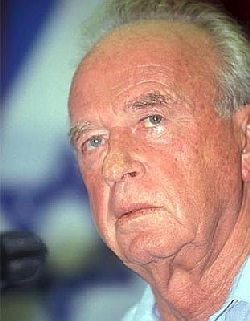.

Commentary;
Before getting all excited about Uzi Dayan, the suddenly turned hawk who just joined Likud, one would do well to take a history lesson from Mordechai Ben-Menachem’s citing of Yitzchak Rabin’s 1992 prime ministerial campaign pronouncement and by reading the link text in it’s totality;

When Yitzhak Rabin ran for election as Israel’s Prime Minister in 1992, he publicly declared at a giant election rally just two weeks before the election, “Whosoever gives up the Golan Heights, abandons the security of the State of Israel.”
Uzi Dayan is a political opportunist who couldn’t crack Knesset under his own Tafnit party banner and so decided to join Likud. Bibi Netanyahu, lacking a big military “Mr. Security” name to counter-balance Ehud Barak, has welcomed Dayan to Likud with open arms.
But consider this about Uzi Dayan;
General Uzi Dayan is a card-carrying member of Israel’s leftist elite. He is one of the major advocates of Oslo. The fact that a general of his stature was on the Oslo staff gave Rabin and Peres just what they were looking for – a ‘military expert’ to lend the murderous agreement an air of sound military judgment. Dayan was also an ardent proponent of the ‘Disengagement’ and of the ‘Separation Fence’.
Small matters like ideological contradictions do not get in his way.
Corruption takes on different forms. Monetary corruption is bad. It undermines the foundations of society. But there is a worse form of corruption – ideological corruption. It is hard to measure ideological corruption and nobody can be tried for committing it. But the ability to jump from one ideological bandwagon to the next any way the political wind blows has brought Israel to the brink of the destruction that we are all feeling today. This corruption joined the Likud on Tuesday.
The point is, don’t be enthralled about what Uzi Dayan says about the Golan Heights, or other any other survival, security issue, i.e.;
The Golan Heights were taken in a just war in 1967, a war which was provoked by an extremist and reckless Ba’athist regime in Damascus. Our presence is both legal and essential. The Golan Heights must be retained under Israeli sovereignty.
Remember what Rabin said before his election as prime minister in 1992, and remember and consider his indirect and secret negotiations with Syria.
Supported the Oslo Accords and the unilateral disengagement from the Gaza Strip. They noted that in the last election, Dayan’s Tafnit Party ran on a platform of unilateral separation from the Palestinians in the West Bank and even published a map with final borders that were far from what would be supported by the Likud.
Remember that it is adage in Israel; When a politician says that he’ll never do something, rest assured that once he’s elected, the previous campaign words find themselves in the circular file of history, i.e. Daniel Pinner’s commentary;
Twenty-five years after the Six Day War, Yitzhak Rabin stood for election as Prime Minister for the second time… During the election campaign, Rabin presented himself as “Mr Security.” His most central election pledges were that he would never engage in dialogue with the PLO, that he would never agree to an armed force west of the River Jordan, that he would never negotiate on east Jerusalem, that even in time of peace, he would not even consider retreating from the Golan Heights.
In fact, within weeks of becoming Prime Minister (by a razor-thin margin), he began open dialogue with the PLO. It would take another few years for the general public to discover that during the election campaign, even while he was solemnly swearing never to talk to Yasser Arafat and his henchmen, Rabin’s closest colleagues were already cutting deals with those very terrorists, promising them weapons, political power, land, training bases and the like in return for Arab support for his political party in the elections.
The rest is history. On September 13, 1993 – barely fifteen months after the elections – Rabin, Shimon Peres and Arafat signed the Oslo … accords.
MB
Dangerous Talks with Syria, by Uzi Dayan and Jonathan Spyer (Jerusalem Post)
Excerpts;
The current indirect talks between Israel and Syria are highly unlikely to result in a peace agreement. The talks, far from playing any positive role for Israel, are mistaken both in terms of our values and in terms of our practical interest. They are being conducted by an irresponsible government with no public mandate, and are already causing real harm. We should be working to isolate the Syrian regime, not rehabilitating it.
From the point of view of values, the government’s approach is fundamentally mistaken. The Golan Heights were taken in a just war in 1967, a war which was provoked by an extremist and reckless Ba’athist regime in Damascus. Our presence is both legal and essential. The Golan Heights must be retained under Israeli sovereignty.
The Syrian regime preached the destruction of Israel, and was directly responsible for the deterioration which made the 1967 war inevitable. There is no moral content to the claim by the same regime that its “rights” were violated by defeat in a war which it had actively sought. Independent Syria controlled the Golan Heights for exactly 21 years. Its borders are based not on some ancient patrimony, but rather on the division of the Ottoman Empire by the Western powers after 1918. Syrian rhetoric regarding its connection to this area lacks all content.
SINCE THE indirect talks with Syria are taking place in Turkey, it is worthwhile comparing our willingness to part with the Golan with Turkey’s attitude to a parallel border dispute with Syria. The issue of the Hatay province (or Alexandretta, as it is known to the Syrians) was a major point of tension between Damascus and Ankara for the better part of the last half century. This area was ceded to Turkey by French-controlled Syria in 1938. Syria, since gaining independence in 1946, demanded its return. Turkey refused to discuss the matter.
In late 2004, Syria conceded the issue in its entirety, quietly accepting Turkish sovereignty over the Hatay province. Perhaps the government of Ehud Olmert might learn something from the approach adopted by the Turks when their interests are at stake. Syrian demands, backed up by the regime’s active support for organizations engaged in daily acts of violence against Israeli civilians, lack any basis in any coherent system of rights or justice.
FROM THE point of view of our interests, the talks in Turkey are equally perplexing. We have taken an active role in ending the isolation of the hostile regime in Damascus. The price Syria has paid for this assistance has been minimal. There is no direct negotiation taking place in Turkey. Rather, Turkish representatives engage in delivering messages between the delegations. This is to enable Syria to maintain its haughty fac,ade of contemptuously refusing all open contact with Israelis.
In return for receiving messages in an Istanbul hotel, the Assad regime has broken out of the isolation that enveloped it following its suspected involvement in the killing of former Lebanese prime minister Rafik Hariri in 2005. The Syrian leader and his wife have been feted in France. Their proxies now hold effective power in Lebanon. Lucrative economic associations with the EU beckon. All this when Damascus remains a key station on the highway linking Beirut and Teheran which today represents the key threat to both Western and Israeli interests in the region. All this when Syrian support for and hosting of terror groups engaged in violence against Israelis continues apace. All this when Syria’s alliance with Iran remains solid as ever, bolstered by Bashar Assad’s recent visit to Teheran.
The latest announcement by Assad of possible willingness to host Russian Iskander missiles is a characteristically Syrian response to the lifting of pressure. Those who believe that offering concessions to Syria will induce reasonable behavior fail to understand this regime. It has been given room to maneuver, and it is maneuvering – in a way directly inimical to the interests of Israel and its Western allies.
IN SEPTEMBER, 2007, Israel succeeded in neutralizing what was apparently a Syrian plutonium reactor, before it began operating. The evidence of the reactor offered mute testimony to Syrian defiance of international law and of its own commitments. However, instead of pursuing this advantage, the government chose to give Assad the diplomatic equivalent of a “get out of jail free” card – in return for nothing and with no agreement on the horizon. The government’s actions are devoid of logic.
Commitments to concessions made in Istanbul by an unpopular government without a mandate will become the starting point for future contacts. This too has the potential to cause real damage to our future stance.
In short, instead of isolating the dangerous regime in Damascus, we are helping to rehabilitate it. This is making possible the effective abandonment of the Hariri tribunal, the strengthening of Hizbullah in Lebanon, the rapid forgetting and forgiving of an apparent Syrian nuclear program and the latest outrageous statement by the Syrian leader regarding the possibility of Russian missiles on Syrian soil. A cynical prime minister who has turned the country’s vital interests into playthings for his personal political legacy is responsible. It is high time that this dangerous charade be ended.
Maj. Gen. (res.) Uzi Dayan, a former head of the National Security Council, is a Likud Knesset candidate. Jonathan Spyer is a Senior Research Fellow at the Global Research in International Affairs Center, IDC, Herzliya.